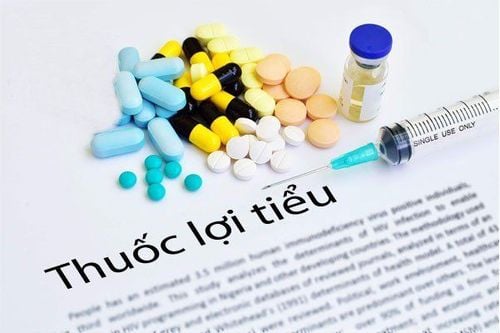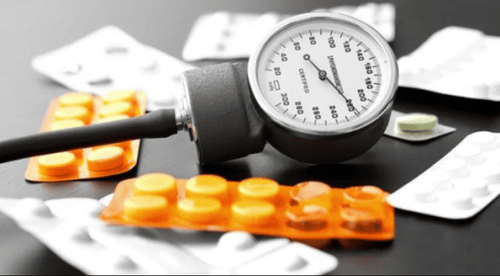This is an automatically translated article.
Afeditab is available in the form of capsules or tablets that are effective in the treatment of the cardiovascular and pharmacological agents of this calcium channel blocker. So what is Afeditab? Uses of Afeditab Please refer to the article below.
1. Uses of the drug Afeditab
What is Afeditab? Afeditab is used alone or in combination to treat severe chest pain or chest spasms, high blood pressure or pain affecting the heart and arteries. Because high blood pressure makes the heart and arteries work harder, increasing the risk of damage to blood vessels and the heart along with other organs causing heart failure, kidney failure or stroke.
High blood pressure also increases the risk of heart attacks. Nifedipine belongs to a class of calcium blockers that work by affecting the movement of calcium into heart cells and blood vessels, causing blood vessels to relax, helping to increase blood and oxygen supply to the heart.
2. Dosage and how to use Afeditab
Afeditab is used in different doses for each specific disease. Doctors can perform tests to assess the extent of the disease from which to have detailed indications for patients treated with Afeditab. In addition, the dose used depends on the strength of the drug, the time between doses and the level of response when using Afeditab in treatment.
Recommended dose according to the instructions for use:
For the treatment of angina or high blood pressure, use Afeditab in capsule form. Adults will take 10mg three times a day. And depending on the severity of the disease, the doctor may increase the dose as needed. Children using drugs when treating in this case will be specifically identified by the doctor and prescribed individually for each case. In the case of treatment with Afeditab in tablet form, the initial adult dose may range from 30 to 60 mg once daily. The doctor prescribes additional doses in case of need, but the total dose should not exceed 90mg per day. In case the patient accidentally takes Afeditab in excess of the prescribed dose and has some signs of unwanted side effects, it is necessary to take the patient to the nearest medical facility for emergency assistance. timely support to help patients overcome dangerous situations.
If the patient has missed a dose of Afeditab while taking Afeditab, the missed dose can be used as soon as he remembers. However, if the interval between the missed dose and the next dose is close, the patient can skip the missed dose and take the next dose of Afeditab. Patients should also be careful not to double the dose because it can cause an overdose of Afeditab and unwanted side effects that affect the patient's condition.
3. Undesirable side effects of the drug Afeditab
In addition to the uses and benefits of Afeditab, patients may still experience some unwanted side effects during treatment with this drug. Some of the side effects of Afeditab:
Common side effects may include symptoms such as bloating, facial swelling, shortness of breath, dizziness, a faster-than-normal and possibly irregular heartbeat, Muscle cramps, rapid weight gain, chest tightness, trembling limbs... Less common side effects include: blue lips and fingernails, shortness of breath, chest pain, chills , decreased urine output, rapid breathing and wheezing, increased sweating... Rare side effects with manifestations such as bleeding gums, blood in urine or stools, body aches, changes skin color, cold sweat, dark urine, dizziness, fainting...
4. Correct use of Afeditab
Afeditab is used to treat blood pressure, but patients should still take measures such as controlling weight and limiting the use of foods that contain a lot of sodium. Therefore, before making changes in eating habits, the patient should see a doctor to be assessed about the diet as well as the changes to suit the patient's current condition. Some patients have high blood pressure but will not notice any abnormal signs, so the patient needs to follow the doctor's prescription for correct medication and regularly check periodically to detect abnormalities if any. When using Afeditab in tablet form, patients should not crush or break the tablet by chewing. This will decrease how well the drug works.
5. Some notes when using Afeditab
When using Afeditab, patients need to perform all tests to make sure the drug is working effectively and to limit unwanted side effects. Patients should not use Afeditab with drugs such as carbamazepine, phenobarbital... Because when these drugs combine, they can cause serious problems
When the patient has signs of dizziness, fainting fainting when changing position to sit down, stand up or lie down and sit up... is warning of drug overdose or when the dose must be increased.
Afeditab can cause watery edema in some patients. Therefore, if the patient has this symptom along with swelling of the face, swelling of the arms, hands, or feet, or tingling, they should stop using the drug and notify the doctor.
Grapefruit and grapefruit juice may increase the effects of Afeditab by increasing the amount of it in the body. Therefore, when using Afeditab, you should not eat grapefruit or drink grapefruit juice.
6. Afeditab drug interactions
Although some drugs should not be used together, in other cases two different drugs can be used to increase the effectiveness of the drug. In these cases your doctor may change the dose or take precautions as needed.
Afeditab used with the following drugs may increase the risk of side effects: cimetidine, dalfopristin, doxazosin, ginseng... Afeditab may interact with some foods, tobacco, alcohol. Afeditab may increase the risk of side effects when used with alcohol, beer, or tobacco. Therefore, if during the time of using Afeditab to treat the patient, it is necessary to give up affecting foods or alcohol and tobacco.
Please dial HOTLINE for more information or register for an appointment HERE. Download MyVinmec app to make appointments faster and to manage your bookings easily.













